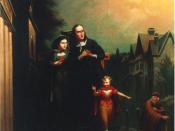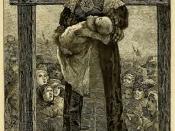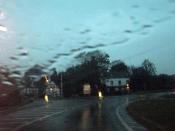Isolation As a consequence of Sin Nathaniel Hawthorne's book, The Scarlet Letter, demonstrates people's tendency to seclude themselves from society instead of being participating members. He develops the concept that isolation is a result of the consequences of sin. The reader sees Arthur Dimmesdale, Hester and Pearl Prynne taking refuge from society in either the forest, the prison or their homes. Hester Prynne's cottage is associated with remote and melancholy feelings. The cottage is "on the outskirts of town" (84), and was abandoned by the early settlers of the New World "because the soil about it was too sterile for cultivation" (84). Also, the cottage is similar to a witch's house in that "a mystic shadow of suspicion immediately [attaches] itself to the spot" (84). The cottage is "shut out from the sphere of human charities" and is so gloomy that it "would fain [be], or at least ought to be, concealed" (84) from society.
Interestingly, the place that society shuns, conceals Hester society's condemnation. Within the "small thatched cottage" Hester is free to "[ply] her needle at the cottage window" (84) and create garments for a colony which scorns her. It is within the safety of the cottage walls that Hester tries to cultivate Pearl's mind without the strict traditions of society. The "darksome cottage"ÃÂ (84) offers protection from society's criticism, and allows Hester to govern herself.
Likewise, the "primeval forest" (191) serves as a safe haven from the judgmental society. At first, the forest is presented as dark and frightening. The Black Man "haunts this forest" trying to persuade Salem's citizens "to write their names with their own blood" in "a big, heavy book, with iron clasps" (193). Also, little light is able to penetrate the thick branches of the trees, and people's actions are kept "from the observation of any casual passenger along the forest track" (194). Hawthorne presents the forest as evil and lawless, because here people are supposedly led astray by the devil. On the contrary, the actions that take place in the forest reveal only the desire for peace and freedom. The forest shields people from the Puritan's condemnatory society. In the forest Pearl laughs and catches the sunshine. The shelter that the forest provides also allows Hester and Dimmesdale to openly express their love. Dimmesdale is bound by false righteousness, and it is in the forest that "Arthur Dimmesdale, false to God and man, might be, for one moment, true" (204). Although Hawthorne presents the forest as the home of evil and witches, it is actually a haven in which people are free from sin, as Hester is momentarily free from the scarlet letter.
Though the prison is meant to be a punishment, it instead offers shelter and tolerance instead of confinement and reprimand. The prison "looked more antique than anything else in the New World" (50), which indicates the rigidity of the Puritans society. Similarly, the image of "a wooden edifice, the door of which was heavily timbered with oak, and studded with iron spikes" (49) gives an impression of firmness and reveals the strict enforcement of the society's laws. The prison is meant to seclude the criminals and non-conformists from the rest of society. Yet, the prison protects its inhabitants from the traditional society. Within the prison strong walls, Hester and Chillingworth can freely discuss their past without exposing themselves to society. Symbolically, the rose growing outside the prison illustrates how restraints can be beneficial. It represents the fact that a person removed from Puritanism is allowed to let unbiased ideas emerge.
The prison, the forest, and the cottage are presented as refuges to society's rigidity. Hawthorne presents isolation from civilization not as a punishment, but more as a place of liberation from a forced and unwanted culture. Hester, Pearl and Dimmesdale remove themselves from society's confining nature and experience the consequence of their sin as a safe haven.





